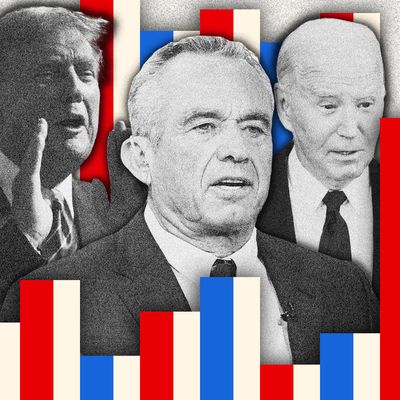
There’s understandably a lot of interest this year in potential voters who dislike both major-party presidential candidates. These “double haters,” after all, played a big role in Donald Trump’s narrow 2016 win over Hillary Clinton; they represented an estimated 18 percent of the electorate that year, and the Republican carried them by 17 points, which was the only reason (other than the existence of the Electoral College) he was able to overcome his profound unpopularity. Trump won “double haters” again in 2020, but Joe Biden narrowly defeated him (despite the existence of the Electoral College), in part because this segment of the electorate declined to a mere 3 percent.
Now, polls show the number of “double haters” is back up to 2016 levels. With both Biden and Trump having served one presidential term marked by limited popularity and a lot of disappointments, it’s unclear which way these unhappy campers might lean. And this year, they have a prominent (if not really viable) third option in independent candidate Robert F. Kennedy Jr. His denunciation of both Republicans and Democrats as representing a “uniparty” characterized by systemic corruption and corporate capture of regulatory agencies would seem well designed for the double-hater constituency.
But there’s bad news for Kennedy from Monmouth University’s dissection of potential voters who dislike Biden and Trump. A new survey from the gold-standard polling outfit suggests the “I hate everybody” vote is equally alienated from the major-party candidates and isn’t wildly fond of Kennedy, either. Like other pollsters, Monmouth identifies the total double-hater vote as representing a bit under one-fifth of the electorate:
Overall, nearly 6 in 10 voters have an unfavorable opinion of either Biden (58%) or Trump (57%). Combined, 2% of the electorate has a favorable opinion of both candidates, 41% has a favorable opinion of Trump only and 39% has a favorable opinion of Biden only. This leaves 17% who have an unfavorable opinion of both candidates.
Unlike some other polls, Monmouth finds Biden leading in this category, but with the important distinction that a majority isn’t inclined to be pushed toward either of the major-party candidates:
Among the double hater voters, 78% say they are not at all enthusiastic about having Biden and Trump at the top of the two major party tickets again. Looking ahead to November, 26% say they are definite or probable Biden voters and 19% are definite or probable Trump supporters. The majority (55%), though, say they are unlikely to vote for either candidate.
While Kennedy currently runs ahead of Biden and Trump among double haters, his support remains limited and to a significant degree dependent on voters who don’t know much about him:
Fewer than 1 in 5 American voters say they will definitely (5%) or probably (13%) vote for Kennedy in November. This 18% potential support level is down slightly from 21% in December. Among voters who are Biden-Trump double haters, Kennedy’s potential support stands at just under 4 in 10 (15% definite and 23% probable), compared with 13% potential support (3% definite and 10% probable) among voters who have a favorable opinion of either major party nominee.
Just over half (55%) of all voters are aware of Kennedy’s support for claims that autism is linked to vaccines and his belief that Covid is targeted to attack certain races. Knowing this information does not change his potential support levels (5% definite and 14% probable after hearing these statements in the poll). However, Biden-Trump double haters are less likely than other voters to have previous knowledge of Kennedy’s positions on these issues (40% aware) and more likely to soften their support after hearing about them (dropping to 26% from an initial potential vote level of 38%).
Since it is almost certain that one or both major-party candidate’s campaign will spend some major resources acquainting voters with Kennedy’s abundantly controversial views, it’s a good bet his already limited support among those alienated from Biden and Trump will decline further as November approaches. So what are double haters to do? As Monmouth reports, a majority plan to stay home. The odds of this happening are increased by the disproportionate number of young voters among these disgruntled citizens (“27% of voters under 35 years old fall into the double hater group, compared with just 16% of those 35 to 54 years old and 10% of those age 55 and older,” notes Monmouth), who are already the least likely to vote of any age category, and where intensely negative feelings about Biden and Trump are common.
As for RFK Jr., perhaps civic-minded Americans should be cheered by the fact that high levels of voter alienation are not leading to any widespread subscription to Kennedy’s vast array of conspiracy theories. Better that potential voters should stay home than to put on tinfoil hats.
More on politics
- Trump Ambassador Picks: Who’s in His ‘Diplomatic Clown Car’
- What We Learned From the House Ethics Report on Matt Gaetz
- Everyone Biden Has Granted Presidential Pardons and Commutations






























